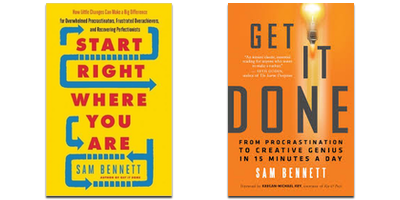
Dear Sam:
I have a question. The book that I want to write…I am wondering if it will be useful or if anyone would want to read it.
What do I do with this feeling of ‘who cares about your work, all the effort you put in is useless….’
If you could help I would be grateful.
Best,
A.
Dear A.,
Every single person throughout human history suffers from self-doubt, secretly believes they are a fraud and wonders if anyone will care about their work.
You are not alone.
In fact, your doubts may be part of what makes you an artist. I’ve heard it said that only dilettantes and amateurs never doubt their talent.
And I’ve noticed that the more daring the creative idea, the more vicious and violent those critical inner voices can become.
So over time, I’ve learned this:
the louder & meaner the voices in my head are, the greater the probability that I’ve just had a really juicy idea.
Think of it this way: the voices in your head are trying to keep you safe.
They don’t want you to put yourself in a vulnerable position.
They try to scare you into inaction by telling you that no one will care about your work. Or worse, that people will judge you harshly.
But art is about making yourself vulnerable.
That’s kind of the point.
Or at least part of the point.
And let’s face facts – it’s possible that you will create something that other people don’t care for.
Fear of failure is entirely reasonable. But it’s no reason not to do your work.
As long as your work remains unwritten in your head, it has no effect on anyone.
Except you. And then not in a good way.
Once you let your idea out of the hermetically sealed vault of your brain and out into the fresh air, the idea will immediately start to evolve. The minute you get it down on a piece of paper, it will change.
And then, once you let it out of the house – once someone else gets to experience it – then you are all changed.
You are changed.
The project is changed.
The audience is changed.
That’s the alchemy of art.
And here’s a real-life example:
Nedi, a vivacious member of my 365 Club, worked with her son to compose a song about Autism.
She finally got the courage to get it mastered, and she posted it online.
She started getting emails and responses – including one from Kate Winslet’s Golden Hat foundation (http://www.goldenhatfoundation.org/) and then she created a Kickstarter Project to move the project into its next phase: http://kck.st/NBCsLo
Here’s what Nedi herself said:
Before three weeks ago, I thought to myself “Who cares if I do my 15 minutes?”
But THEN a little voice said to me, “Samantha would care.”
So, on the off chance that the voice was right, and to keep myself on track: I will tell you that I completed 30 min. the first week, 60 the next, and since yesterday’s call – 90 min!
Much Gratitude and Affection,
NEDI
Inspiring, right?
Those critical voices will always be with you. I’ve never met an artist who didn’t struggle against them. Me included.
It’s up to you to decide if they get to run the show.
I can’t guarantee you that getting your work out there will always lead to success.
I can guarantee you that not getting your work out there will always lead to feelings of failure.
If you would like a very inexpensive way to get some additional encouragement and support, you might enjoy participating in the extremely groovy membership club I’ve started — we’re having a blast!
Please let me know how it goes for you.
Remember: The World Needs Your Art.

A PRAYER FOR THE CAPABLE
And as you stand there
On time and
Appropriately clad for the event
With a high-fiber bar in your bag
And extra pens
Let us take this moment to applaud you.
You, the prepared.
You, the accomplished.
You, the bills-paid-on-time and the-taxes-done-in-March.
You, who always returns the shopping cart.
You, who never throws a tantrum.
While the moody, the irresponsible, the near-hysterical and the rude seem to get
All the attention
Let us now praise you.
Just because everyone always expects you
To do well
Does not make it any less remarkable
That you always do so well.
So thank you.
For picking up the slack
For not imposing
For being so kind
And mannerly
And attending to all those pesky details.
Thank you for your consideration
Your generosity
For always remembering and never forgetting:
That a job well done is its own reward
That the opportunity to help someone else is a gift
That the complainers, the cry-babies, the drama queens, the never-use-a-turn-signals, the forgetful, the self-involved, the choleric, the phlegmatic and the your-rules-don’t-apply-to-me-types
Need you to rebel against in order to look like rebels.
You provide the lines – for without the lines, what would they color outside of?
So take a minute
To pat yourself on the back
And say, “Job well done.”
And as you consider someday
Showing up stoned
Or unprepared
Or not at all
And as you imagine someday being imperious
Or demanding
Or the one with the temper
Hear the unspoken “thank you” from a
Grateful nation that is a
Better, smarter, calmer, easier, friendlier and more organized place
Thanks to you
And your dogged diligence.
You are beautiful.
You are precious to us.
You are the hand that calms the water, the wheel that never squeaks, the one we all rely on
And while you probably would have remembered to send a thank-you note,
We forgot.
And just because everyone always expects you
To do well
Does not make it any less remarkable
That you always do so well.
And I would tell you to take the afternoon for yourself
Or sleep in tomorrow
But I’m pretty sure you already have plans.
So just take this very moment right now
To appreciate you
And all that you have done and done well
Even by your own high standards.
And remember:
You are beautiful.
And just because everyone always expects you to
Do well
Does not make it any less amazing, delightful or delicious that
You always do so well.
© Samantha Bennett 2014

And as you stand there
Your eyes brimming with tears because you just saw
That commercial
And you are wondering why you even try to maintain your composure when
Everything you feel shows on your face
And your heart is permanently attached to
Your sleeve
Let us now praise you.
You, as innocent as that tattered toy you’ll never get rid of.
You, as vulnerable as the dawn (though everyone thinks you’re as brave as high noon).
You, with the soul that’s older and deeper than the sea.
You are beautiful.
You are the one we turn to when we need a
Shoulder to cry on
A hand to hold
Or just some fervent praise to make us feel good about ourselves.
You are our biggest fan.
And while you sometimes get trapped by that voice in your head that says
You fool
You fool
You fool
Why can’t you just for once
Go for the money
Let it slide
Not take it all so personally
(Although, how else a person would take it is a bit of a mystery…)
And why can’t you learn to just
Suit up and show up and shut up?
But no.
Your feelings are how you know you’re alive.
And while the family you were born into may still call you:
Sensitive, too sensitive, waaaaaay too sensitive, weird, artsy, melodramatic, a big ol’ drama queen, psychic, unique, odd, old-fashioned, eccentric, misguided, special, tolerant of ambiguity, optimistic, viciously self-critical, expressive, inventive, pollyanna, misunderstood, different, deluded, ambitious, contrary, talkative, awake, gifted, diverse, scary, intense, playful, iconoclastic, independent, freaky, unrealistic or just plain crazy
You know better than to expect them to understand you.
And you have made your own
Family of friends and orphans and strays and
You would do anything for them
And have, come to think of it.
But you don’t keep score like that. Which is a good thing,
Because you would never come out even.
You overshare, overcompensate, overthink, overdo, overanalyze, overtalk and
Overwork – a word for which the past tense is: overwrought.
You, my beautiful love, are overwrought.
And we don’t want you any other way.
For it is you who looks every single homeless person in the eye.
You who can recall the name, birthdate and astrological sign of every person we’ve ever dated.
You, who rescues the animals,
Sings to the children,
Spots our moment of despair from across the room and rushes in, heedless, to hug and hold us when we never even knew what hit us.
But you knew.
You may not believe in psychic ability, but it does seem pretty freaking obvious to you pretty much exactly what is going on with pretty much everybody pretty much all of the time.
And you can’t believe we can’t see it, too.
And all that discernment and intuition and, yes, sensitivity, makes
Going to parties a horror show and
Getting dressed for parties even worse –
And not being invited to parties the very worst thing of all.
But remember about your need for solitude.
And remember the joy you feel when you lose yourself in your work, your art, your craft.
And remember, please, to take good care of your tender self and not watch scary movies like the evening news and not hang around negative-toxic-energy-vampire-people and remember to move your seductive body and
Lift your eyes to the sky because no one knows like you that:
All This Has Come To Pass.
And while we all wish you wouldn’t drink so much,
We understand why you do.
And we are so grateful to you.
You are so beautiful.
And we know that it is not that
You are over-sensitive,
It’s just that
The rest of us are under-sensitive.

There is only one thing that ever changed the world: A NEW STORY.
So if you want to change the world, you must begin to tell a new story.
Stop repeating the stories created by the info-advert-tain-u-ment industry.
Instead:
Look closely and notice something remarkable about the world.
Be still.
Listen.
Ask a question you’ve never thought of before.
Tell a new story.
Stop repeating your old stories about yourself and what you are and are not capable of.
Instead:
Look closely at your life and notice something unusual.
Be still. Do not rush to judgment.
Listen.
Ask yourself something about you that no one has ever asked before.
Tell a new story.
Stop rehearsing stories about the future.
Instead:
Look closely and notice that which is the same as it ever was. (#sameasiteverwas)
Be still.
Listen to the rhythm of history as it meets a new beat.
Tell a new story.
I talk to people every day who say,
“I’m not sure what to write/create…”
And I say,
“Of course you don’t.
You haven’t done it yet.”
Luckily, it’s not too late.
And the world is desperate for your story.
Please –
Tell us a new story.

What if the opposite is true?
This is a question I ask myself all the time.
For example, you say, “Oh, I don’t have time to write a book.”
What if the opposite is true ?
What if the truth is, “I don’t have time to NOT write a book.”
In other words –
Life is fleeting. The future is uncertain. You can’t afford the luxury of believing that you will have a chance to write this book in the future — you MUST write this book right now.
Interesting, huh?
Or maybe you say, “Everyone is already writing a book.”
When the truth (the opposite) is, “No one is writing my book.”
Or you say, “I don’t know how to write a book.”
When the truth (the opposite) is, “I know enough to start. And I know enough to get help and guidance.”
Speaking of which, I’m putting together a small group of smart people who want to write a GOOD book for a day-long event that will end with you having:
🧐 Perfect Clarity on which book you are actually writing (style, structure, genre, format)
🤓 A Solid Decision about which publishing path is right for you (self-, hybrid, or traditional)
😎 Created a joyful, workable plan for you to get the whole thing done by the end of April. F’reals.
This is a small-group, heavily interactive, online event.
This is a small-group, heavily interactive, online event.
Let’s do this thing.
If you are interested in finding out more, please write me back and we’ll see what’s what.
No pressure.
No sales.
And, actually, it really helps me to hear directly from you what you’re up to, so you’d be doing me a favor.
If you are thinking now, “I don’t think this offer is for me….”
I encourage you to consider:
What if the opposite is true?
What if this offer is the absolutely most perfect thing you could do to bring your book to life in 2025?
Happy New Year!
P.S. This year alone I’ve helped dozens of writers get their books and book proposals out into the world in a fun, holistic, gentle, and creative way.
Oh, and I also wrote and published my own award-winning book. I think it would be fun to work with you, too : ) – S.
![Your Weird Thing Could Make You $10k by Halloween]()
Intro
In today’s world, where economic uncertainty and personal challenges abound, the idea of becoming your own economy can seem far-fetched. Yet, within every one of us lies a tremendous potential that, when harnessed, can transform not just our financial situation, but our entire mindset and life trajectory. Here’s how you can leverage your unique skills and creativity to make $10k by Halloween.
Embrace Your Inner Economy
We start by embracing the fact that we are our own economy. A creative person has the power to generate income in ways that are both innovative and liberating. It’s not about waiting for the right job or someone else’s approval; it’s about leveraging your talents to create financial opportunities.
The Power of Entrepreneurship
Being an entrepreneur is not just about starting a business; it’s about a mindset. You can unlock significant resources by working smarter, not harder. The key is to focus on creating something valuable—whether it’s a product, a service, an experience, or even sharing your knowledge.
Let’s explore some inspiring stories and ideas to stimulate your imagination:
- Soup Subscription Service: One woman showcased her culinary skills by creating a soup subscription business with her son, earning $2,500 a month by delivering homemade soups to busy professionals. Simple yet effective!
- Ballerina Bootcamp: Turning a passion into profit, a dancer funded her dream role by sharing her intensive daily workouts with subscribers, making $10k in six weeks.
- Artistic Greeting Cards: An artist sold unique, hand-crafted greeting cards, donating part of the proceeds to charity, effectively merging art with purpose and generating significant income.
By focusing on what you love and pairing it with what you’re good at, you can create sustainable income streams that align with your passions.
Crafting Your Unique Path
Creating your business model is an art form. Here are several models to consider:
- Product-Based: Create and sell a physical product, like artisanal foods or handmade crafts.
- Service-Based: Provide a service, such as personal training or coaching.
- Teaching: Offer your expertise through workshops or online courses.
- Experience: Design memorable events or retreats.
- Community: Build a network or group that people pay to join.
- Consultancy: Provide advice based on your expertise.
- Trainer Training: Educate other teachers in your field.
- Thought Leadership: Curate and share expert insights, establishing yourself as an authority.
Overcoming Personal Barriers
Believing in your capacity to generate income is the biggest hurdle. Many are daunted by the fear of failure, the imposter syndrome, or simply the overwhelming thought of starting something new. However, it’s crucial to shift from thinking to doing. Take that first small step today—commit just 15 minutes daily to your goal.
Investing time in communities of like-minded individuals can provide invaluable support and inspiration. Engaging with others who share your goals can help affirm your ambitions and keep you accountable.
The Invitation
As a special note, if you’re serious about making this change, consider joining our “Get It Done Lab” where we will pave the way for you, step by step, over the next 90 days to reach that $10k goal. Embrace the opportunity to transform your life with focus, creativity, and determination.
Remember, it’s not about rushing towards a goal; it’s about consistent progress. Whether it’s funding your dreams, securing your future, or breaking free from the confines of traditional income routes—your weird thing could be your next big thing. Start now, and make that $10k by Halloween a reality.








